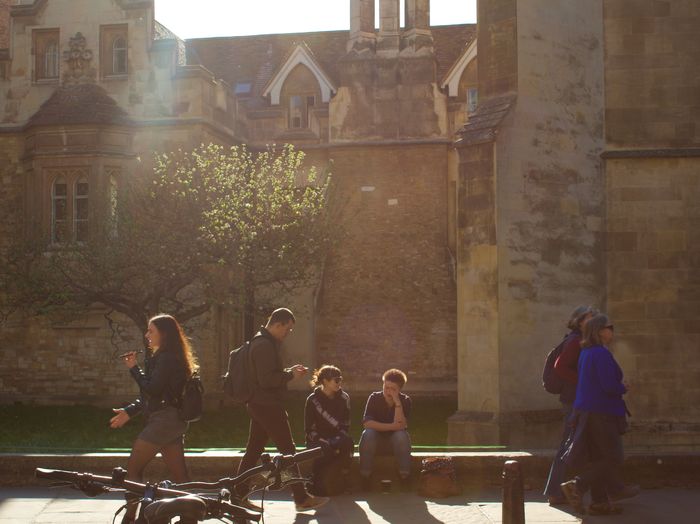Cambridge’s European exodus: EU undergrad enrolments fall by a fifth post-Brexit
New data reveal the impact on Cambridge as EU student enrolments more than halve nationwide

EU undergrad enrolments at Cambridge are down 19% from 2020/21, Varsity analysis of data for the first full post-Brexit year shows.
In the academic year 2021/22, 875 EU students started undergrad courses at Cambridge, compared to 1,075 the previous year, according to Higher Education Student Authority (HESA) data.
Nationwide, the number of EU students enrolling in British universities has more than halved. The largest declines post-Brexit are in students coming from Italy, Germany and France.
HESA called the change “significant”, attributing it to “changes in fees eligibility”. Before Brexit, up till the 2020-21 academic year, EU undergrads paid the same tuition fees as UK students — they now pay the same as non-EU international students and cannot access support from UK Student Finance. For 2023 entry, Cambridge’s international student tuition fees range from £27,333 to £63,990.
Across the UK, the reduction in the enrolment of EU students is most significant at the undergraduate level, with just 13,155 EU students enrolling in 2021 to start undergraduate degrees, compared with 37,530 the year before.
At Cambridge, reductions in EU student enrolments are similar for undergraduate and postgraduate courses; postgrad enrolments for 2021/22 were down 18% on the year before, compared to 19% for undergrad courses.
Overall, 18% fewer EU students started courses at Cambridge in the first full post-Brexit year, following a 7% drop between 2019/20 and 2020/21.
Compared to 2017/18, overall EU enrolments at Cambridge are down 24%, with postgrad enrolments down by 25% — the 2017/18 academic year was the first for which most applications would have been made after the UK’s vote to leave the EU in June 2016.
Before the Brexit transition period ended on New Year’s Eve 2020, EU student enrolments had been climbing at Cambridge, peaking in the 2019/20 academic year, when 2645 EU students began courses at the university.
Last year, a Spanish charity which advises students on applying to top universities wrote to the then Cambridge vice-chancellor Stephen Toope to say that they are now “actively discouraging” their students from applying to UK unis, including Cambridge, due to “impossibly high post-Brexit tuition fees”.
As EU student numbers fall across the UK, there has been a significant increase in international student enrollments from outside the EU — but Universities UK said that this has not countered the reduction in EU students at the undergraduate level.
HESA data show “very clearly the impact of the sort of loss of freedom of movement and the change in European students fee status, but also, and critically for undergraduates, the loss of access to student loans”, said Universities UK’s head of global mobility policy, Charley Robinson.
The decline in the number of EU students comes as new stats demonstrate the collapse of European research funding for Oxbridge. Cambridge, which was awarded £433 million over the seven years of the last European research funding programme (Horizon 2020) has not received any funding in the first two years of the new Horizon Europe programme.
In August 2022, Dr Augusta McMahon, an archaeologist, left Cambridge University after 26 years to work at Chicago University, citing Brexit uncertainty as a significant factor in her decision. McMahon had noticed the decline of EU students on campus and claimed that fewer European lecturers were applying for UK jobs.
Brexit has also meant that the UK no longer takes part in the Erasmus+ scheme, which facilitates short term exchanges between European universities, providing students with monthly grants while studying or working abroad.
Erasmus+ was the primary source of funding and university places for MML students on their year abroad, a compulsory part of language degrees at Cambridge. Although not all students spend their year abroad in Europe, for many language choices, such as Italian and German, there are few other options.
Erasmus+ has been replaced with the Turing scheme in the UK, which aims to provide funding for UK students to travel to countries across the world, rather than just within the EU.
While Cambridge is no longer a participant in Erasmus+, it has maintained study exchanges with EU partner institutions, and agreements with universities elsewhere, such as in Latin America, are unaffected.
Varsity has approached the University of Cambridge for comment.
Has your year abroad been impacted by Brexit?
Varsity would like to hear about your experience, and your anonymity will be protected at all times. Contact us at investigations@varsity.co.uk.
 News / Cambridge student numbers fall amid nationwide decline14 April 2025
News / Cambridge student numbers fall amid nationwide decline14 April 2025 Lifestyle / First year, take two: returning after intermission14 April 2025
Lifestyle / First year, take two: returning after intermission14 April 2025 News / First candidate to announce chancellorship bid pledges to tackle bullying 12 April 2025
News / First candidate to announce chancellorship bid pledges to tackle bullying 12 April 2025 News / Uni to ‘review’ tripos rankings and weekend lectures in undergrad teaching overhaul10 April 2025
News / Uni to ‘review’ tripos rankings and weekend lectures in undergrad teaching overhaul10 April 2025 News / PETA urges Cambridge dictionary to change ‘derogatory’ rat definition11 April 2025
News / PETA urges Cambridge dictionary to change ‘derogatory’ rat definition11 April 2025






